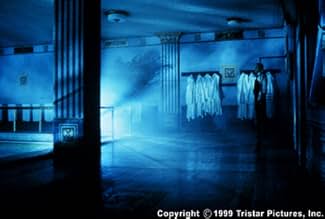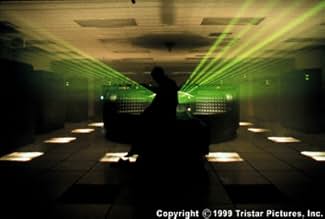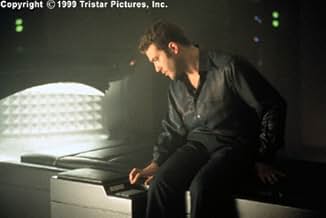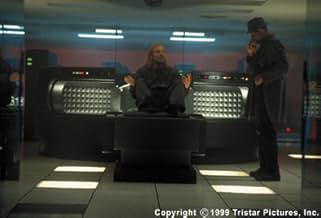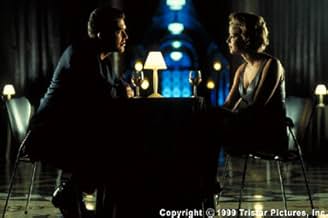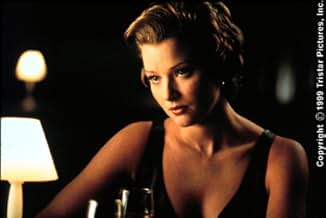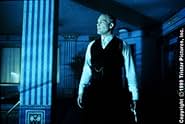Un informaticien effectuant une simulation de réalité virtuelle de 1937 devient le principal suspect lorsque son collègue et maître est assassiné.Un informaticien effectuant une simulation de réalité virtuelle de 1937 devient le principal suspect lorsque son collègue et maître est assassiné.Un informaticien effectuant une simulation de réalité virtuelle de 1937 devient le principal suspect lorsque son collègue et maître est assassiné.
- Réalisation
- Scénario
- Casting principal
- Récompenses
- 1 nomination au total
Brad William Henke
- Cop #1
- (as Brad Henke)
Bob Clendenin
- Bank Manager
- (as Robert Clendenin)
Avis à la une
This movie was both critically and financially panned. Why?
Two words. The Matrix.
The Thirteenth Floor is a good movie. No, it's not "The Matrix" all over again, but it wasn't trying to be.
This is what happens when two movies of similar type are released in close proximity. The first one always has a jump-start on the second by means of box office success and pleasant reviews. That's why I think "The Thirteenth Floor" was branded as a bad movie. People had already seen "The Matrix" with it's knock-out special effects, cast and action. They weren't open-minded for a movie on the same genre branch. So The 13th Floor was said to be 'a bland, pale imitation of the Matrix'.
"The Thirteenth Floor" doesn't have a star-studded cast. Yes it's cast is mostly regular supporting players, but they work well with the material. So there's no kung-fu ass kicking scenes, so what! There's great atmosphere, a intriguing story and a real nice plot twist. To me that makes up a very fine movie. So I ask what was so very wrong with "The Thirteenth Floor" that made critics turn away and made it tank at the box office? Really it's people's unwillingness to give a similar movie a chance and instead opting to take the easy route and branding it as a "rip-off". Which is their loss unfortunately.
Two words. The Matrix.
The Thirteenth Floor is a good movie. No, it's not "The Matrix" all over again, but it wasn't trying to be.
This is what happens when two movies of similar type are released in close proximity. The first one always has a jump-start on the second by means of box office success and pleasant reviews. That's why I think "The Thirteenth Floor" was branded as a bad movie. People had already seen "The Matrix" with it's knock-out special effects, cast and action. They weren't open-minded for a movie on the same genre branch. So The 13th Floor was said to be 'a bland, pale imitation of the Matrix'.
"The Thirteenth Floor" doesn't have a star-studded cast. Yes it's cast is mostly regular supporting players, but they work well with the material. So there's no kung-fu ass kicking scenes, so what! There's great atmosphere, a intriguing story and a real nice plot twist. To me that makes up a very fine movie. So I ask what was so very wrong with "The Thirteenth Floor" that made critics turn away and made it tank at the box office? Really it's people's unwillingness to give a similar movie a chance and instead opting to take the easy route and branding it as a "rip-off". Which is their loss unfortunately.
"The Thirteenth Floor" is among the best and most thoughtful sci-fi ever made. The plot is intelligent and unfortunately many said "professional critics" did not understand the complex story and wrote bad reviews (Metacritic 3.6?). Yesterday I watched this film for the second time, and it is still impressive and engaging. Disregard the bad reviews and enjoy this underrated gem. My vote is eight.
Title (Brazil): "13º Andar" ("13º Floor")
Title (Brazil): "13º Andar" ("13º Floor")
The film, without an A-list cast, pulls off the plot well. The characters, although not really deep, are well structured, and the plot constructed with subtle complexity. The 1930s scenes are dramatically created. I found myself trying to guess the plot twists, but with little success as they unfolded. It was a good film, and richer in substance than the Matrix, and left you with a thought provoking afterthought about our own existence. Going into a movie, I hope to have avoided any prior information about the plot, and this one was well worth the purchase of the video. This could have made a great 3 hour movie to really develop the characters and the philosophical issues, however, it was reduced down to the 100 minutes time-span. I'd give it 8 out of 10.
As the last millennium comes to a close and a new one opens, the science fiction genre seems to have latched onto a brand new narrative format - the cyber/techno thriller, wherein characters are free to wander in and out of virtual reality worlds and are even forced to call into question the validity of the world we have hitherto smugly referred to as "reality."
In 1999 alone, this theme has been explored in "The Matrix", "eXistenZ" and "The Thirteenth Floor." Actually, of the three, this is probably the most intriguing, intelligent and involving, successfully combining the elements of a whodunit with a clever sci-fi tale of a group of characters who drift in and out of a simulated version of Los Angeles in 1937. The plot, though complex, is spun out with coherence and ever-increasing clarity as the layers of information are slowly peeled back to reveal the larger picture. The filmmakers manage to create a sense of unbalance in the audience as we and the characters become more and more unclear as to what is reality and what is a simulation. Because the writers never lose their way, the result is a work of considerable mystery and intrigue.
In terms of art direction and cinematography, the film is a total triumph. The Los Angeles of 1937 the moviemakers have visualized on screen actually has a slight studio backlot, artificial feel to it - perfectly befitting just the kind of world a simulator would create. The photography in these sections also utilizes a slightly off color cast, nicely reflecting the tone found in color pictures of that era.
"The Thirteenth Floor" may not be a very "deep" movie, but it is an honorable addition to a newly formed genre that has not yet had time to ossify in its own conventions. Time alone will tell if filmmakers will be able to expand on this theme or whether, as with most genres, it will fall victim to its own inevitable cliches.
In 1999 alone, this theme has been explored in "The Matrix", "eXistenZ" and "The Thirteenth Floor." Actually, of the three, this is probably the most intriguing, intelligent and involving, successfully combining the elements of a whodunit with a clever sci-fi tale of a group of characters who drift in and out of a simulated version of Los Angeles in 1937. The plot, though complex, is spun out with coherence and ever-increasing clarity as the layers of information are slowly peeled back to reveal the larger picture. The filmmakers manage to create a sense of unbalance in the audience as we and the characters become more and more unclear as to what is reality and what is a simulation. Because the writers never lose their way, the result is a work of considerable mystery and intrigue.
In terms of art direction and cinematography, the film is a total triumph. The Los Angeles of 1937 the moviemakers have visualized on screen actually has a slight studio backlot, artificial feel to it - perfectly befitting just the kind of world a simulator would create. The photography in these sections also utilizes a slightly off color cast, nicely reflecting the tone found in color pictures of that era.
"The Thirteenth Floor" may not be a very "deep" movie, but it is an honorable addition to a newly formed genre that has not yet had time to ossify in its own conventions. Time alone will tell if filmmakers will be able to expand on this theme or whether, as with most genres, it will fall victim to its own inevitable cliches.
The Thirteenth Floor is one of those films that has gotten lost under all the more well-known films of the late nineties; and this is a shame, because it's a damn sight better than a lot of the films that always receive praise from the critics. Not everything in this film works, and for that reason and others; it's no masterpiece, but you've got to admire The Thirteenth Floor for it's originality, and it's ability to pull a coherent plot out of a scenario that has 'disaster' written all over it. The film is based on the book "Simulacron-3" by Daniel F. Galouye, which is the same book that inspired Rainer Werner Fassbinder's "World on a Wire". Whether or not this version is better, I can't tell you having not seen Fassbinder's version; but I can tell you that this version is worth seeing. The film follows the death of a computer programmer. He was working on a computer simulated world before his death, and his colleague; Douglas Hall, believes that the programmer left the key to discovering his murderer inside the virtual world...prompting him to go in search of it.
The film works both as an entertaining science fiction flick, and a thought provoking drama. The film asks questions about the value of life and the ills of playing God; and although these questions have been asked by many films many times before; here, it's done so well that you forget that and ask yourself these questions all over again. The twist at the centre of the movie extremely well worked, and after it hits you'll ask yourself how you didn't guess it sooner - and that is testament to the excellent plotting preceding it. Despite being a science fiction film, there is very little in the way of special effects in this film. However, the movie makes up for this with the excellent way that 1937 Los Angeles is created - it's easy to buy into the film's multi-world plot, and for that reason; it doesn't need special effects to work. The acting is largely good, with Craig Bierko impressing in the lead role. Vincent D'Onofrio, Gretchen Mol and 24's Dennis Haysbert, who is excellent in his small role, support him. On the whole, this isn't brilliant or a masterpiece; but as far as modern Sci-Fi goes; this is one of the best I've seen.
The film works both as an entertaining science fiction flick, and a thought provoking drama. The film asks questions about the value of life and the ills of playing God; and although these questions have been asked by many films many times before; here, it's done so well that you forget that and ask yourself these questions all over again. The twist at the centre of the movie extremely well worked, and after it hits you'll ask yourself how you didn't guess it sooner - and that is testament to the excellent plotting preceding it. Despite being a science fiction film, there is very little in the way of special effects in this film. However, the movie makes up for this with the excellent way that 1937 Los Angeles is created - it's easy to buy into the film's multi-world plot, and for that reason; it doesn't need special effects to work. The acting is largely good, with Craig Bierko impressing in the lead role. Vincent D'Onofrio, Gretchen Mol and 24's Dennis Haysbert, who is excellent in his small role, support him. On the whole, this isn't brilliant or a masterpiece; but as far as modern Sci-Fi goes; this is one of the best I've seen.
Le saviez-vous
- AnecdotesDouglas Hall's house has been seen before in several other science fiction films: as the exterior Detective Deckard's apartment building in Ridley Scott's Blade Runner (1982), and several years later as the apartment of a drug lord in Predator 2 (1990). Located in the affluent Los Feliz neighborhood of Los Angeles, the home is known as the Ennis-Brown House and was designed by legendary architect Frank Lloyd Wright.
- GaffesWhen Douglas asks Grierson (Hanlon Fuller) about having flashbacks, Grierson references being in World War I. Since the program is set in the 1930s, prior to the second World War, Grierson wouldn't refer to the previous war as World War I. Before World War II, World War I had other names, most famously "The Great War." While it is a computer program, and knowledge doesn't necessarily operate the same way as in the "real world," there's no logical reason for characters to be programmed with that term, and Hanlon, as the designer, would know the proper terminology for the time since he actually lived during the 1930s.
- Citations
Hannon Fuller: [First lines] Ignorance is bliss. For the first time in my life, I agree.
- Crédits fousBefore the opening credits, this René Descartes quote is seen on screen: "I think, therefore I am".
- ConnexionsFeatured in HIM: Join Me in Death - Laser Version (2000)
- Bandes originalesEasy Come, Easy Go
Written by Edward Heyman and Johnny Green
Performed by Johnny Crawford and his Dance Orchestra
Featuring Vocalist Meghan Ivey
Meilleurs choix
Connectez-vous pour évaluer et suivre la liste de favoris afin de recevoir des recommandations personnalisées
- How long is The Thirteenth Floor?Alimenté par Alexa
Détails
Box-office
- Budget
- 16 000 000 $US (estimé)
- Montant brut aux États-Unis et au Canada
- 11 916 661 $US
- Week-end de sortie aux États-Unis et au Canada
- 3 322 416 $US
- 30 mai 1999
- Montant brut mondial
- 18 564 088 $US
- Durée1 heure 40 minutes
- Couleur
- Mixage
- Rapport de forme
- 2.39 : 1
Contribuer à cette page
Suggérer une modification ou ajouter du contenu manquant




